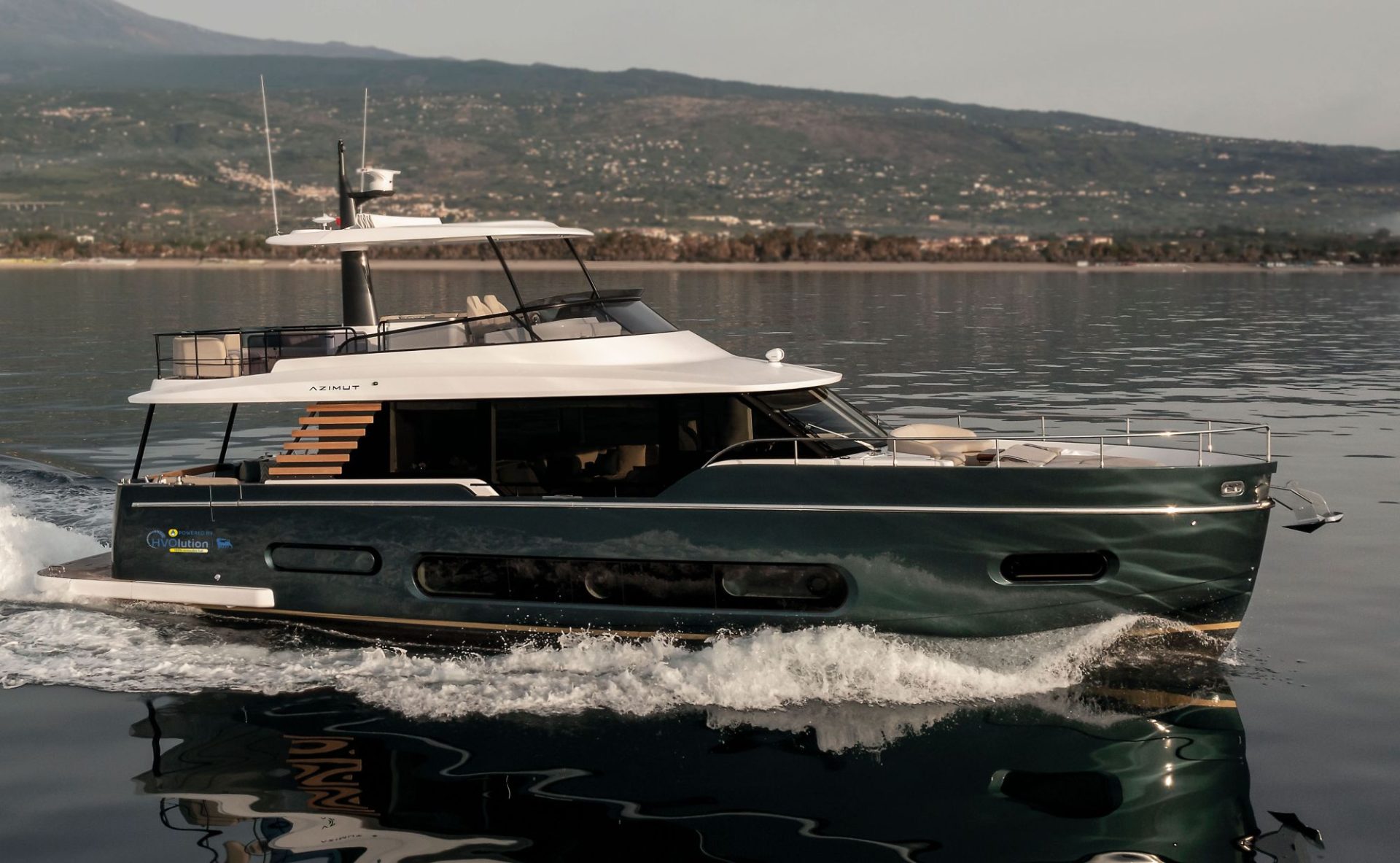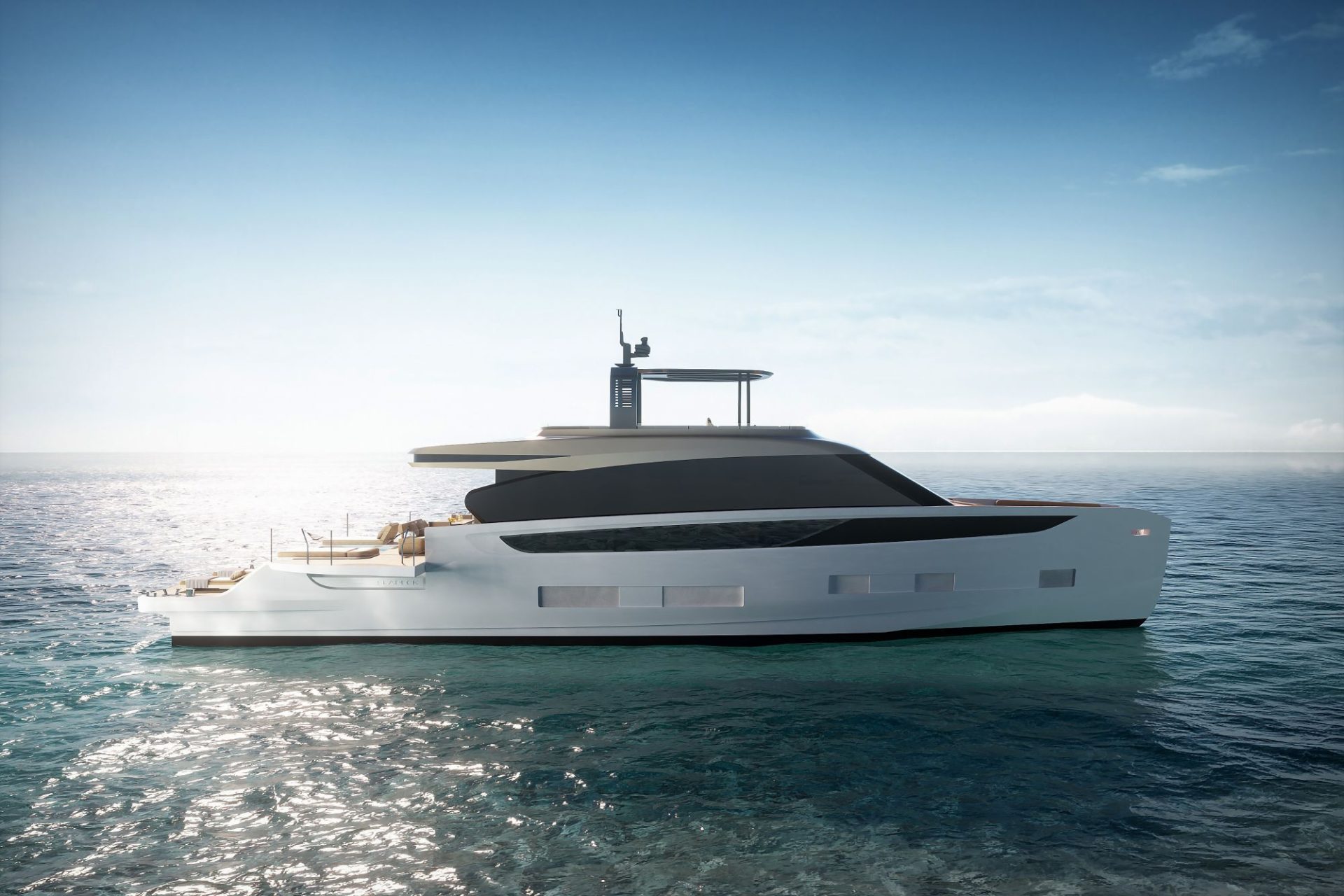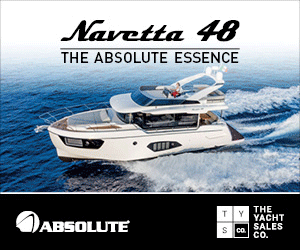Green path certified
Twenty years after the launch of Azimut’s pioneering strategy for reducing CO2 emissions, the shipyard presents concrete results and new goals.
20 September 2023
Azimut, leader in the design and production of yachts that marry technology and beauty, celebrates the nautical new year and the 45th Cannes Yachting Festival with a press conference dedicated to the route charted to reduce environmental impact by lowering CO2 emission.
The shipyard presented the results of its efforts, certified by an independent scientific panel, and the new goals to be pursued with concrete actions and partners to guide the sector toward progressive decarbonisation: the Politecnico di Torino, Eni Sustainable Mobility, Lloyd’s Register and Superyacht Eco Association, a non-profit organisation created by the Yacht Club de Monaco and Credit Suisse.
Milestones in Azimut’s green path – which includes the first fuel cell tested on board, the first hybrid yacht and a fleet of Low Emission Yachts that emit up to 30 percent less CO2 than comparable boats with shaft line propulsion – are the new models unveiled in preview to the public at the press conference: the Seadeck 9 and the Grande 30M.
For more than two decades, Azimut’s approach to the topic of reducing emissions has been based on constant research and investment in developing the best available technologies to make a difference in the immediate future.
“We don’t just wait for the solutions of the future, we combine tomorrow-oriented research with today’s concrete answers, validating our research with the best scientific and certification bodies,” explains Giovanna Vitelli, Chair of the Azimut|Benetti Group.
This approach also involves the search for alternatives to fossil fuels, an activity conducted by the Group’s R&D department, which involves scouting and testing of solutions ranging from biodiesel to synthetic fuels.
The desire to evaluate which solution could be immediately applicable and effective with a scientific and objective method pushed the shipyard to contact the Energy Department of the Politecnico di Torino and Professor Massimo Santarelli, professor of Advanced Energy Systems at the Piedmont university and the KTH Royal Institute of Technology in Stockholm.
Politecnico di Torino study
The Politecnico, drawing on the experience gained in the automotive and aviation sectors, has thus conducted an independent and extensive study on alternative fuels for the pleasure boating industry.
The study analyses HVO biodiesel, methanol and hydrogen, comparing their efficiency, safety, availability and costs in a short and medium-term horizon.
The results, presented by Professor Santarelli, highlighted the advantages of biodiesel compared to methanol and hydrogen: green or synthetic methanol, the type effective in reducing CO2 emissions, is an option that cannot be implemented in the short term due to critical issues related to production and distribution but could be promising in a longer term.
Grey methanol, on the other hand, has a higher life cycle footprint than traditional diesel. Hydrogen represents a distant alternative due to the complexities of storage and safe management on board.
“Today, biodiesel is the only viable alternative to fossil fuel and at present is the most effective to contribute to the decarbonisation of the pleasure boat sector,” clarifies Professor Santarelli.
HVO biodiesel is the most mature solution at the moment, ready for immediate and practical use; adoption does not require significant changes to the storage or propulsion system.
The result convinced the Group’s R&D to continue experimenting with forward-looking options and confirms the path that was undertaken twenty years ago by combining the use of diesel-electric or hybrid propulsion with the most advanced naval architecture in the category – that of Azimut’s Low Emission Yachts: carbon-fibre, high-efficiency hulls and propulsions – and the best alternative fuel. This is the way to lower CO2 emissions, starting today.
The Azimut|Benetti Group & Eni Sustainable Mobility
The study by the Politecnico di Torino confirms the path taken by the Group in launching the first partnership of a company in the sector with Eni Sustainable Mobility, the Eni company dedicated to accelerating the path towards mobility carbon neutrality.
The agreement, announced in June 2023, involves replacing the fuel used for sea trials, technical tests and transfers of prototypes and newly produced boats – approximately 700,000 liters in total per year – with HVOlution, the biofuel from renewable* raw materials created by Eni, which reduces CO2 emissions by up to 90 percent compared to the reference fossil mix, depending on the specific raw materials used for its production**.
The R&D department of Azimut|Benetti Group was the first to extensively test the HVOlution biofuel for use in the nautical sector. Azimut also used biodiesel in specific laboratory tests of the new Magellano 60 which, during summer, sailed in the Mediterranean powered by HVO. The tests recorded a reduction in well-to-wake CO2 emissions of more than 80 percent compared to a yacht of comparable size powered by fossil fuel.
Azimut|Benetti Group collaboration with Lloyd’s Register and SEA Index
The actions advanced by Azimut to guide the industry towards a more conscious and scientific approach to the topic of environmental sustainability find fulfilment in the ambitious project announced at the press conference.
After two decades of research to reduce CO2 emissions, the shipyard is observing significant growth in the relevance of emissions as a discriminating factor in the purchase of a yacht.
This trend highlights the absence of standardised and transparent communication that allows owners to collect, read and compare the information provided by the various players in the sector; tools that are already widely used in the automotive and real estate industries. From this awareness, the Group started to collaborate with Lloyd’s Register and the Superyacht Eco Association, which through the SEA Index calculates the CO2 emissions of yachts from 25 to 100 metres and beyond.
In September 2023, Azimut became a corporate member of the SEA Index to support the association in the definition of an objective carbon emission index that permits comparison for yachts under 24 metres as well, the most common category in our seas which includes some of the shipyard’s iconic models, each of them successful between the public and the market.
Azimut, together with Lloyd’s Register – one of the main classification bodies in the maritime sector – has realised a consumption and CO2 emissions certification plan in standard conditions.
Lloyd’s, based on the tests carried out with Azimut yachts and a database integrated with the Shipyard’s findings, has developed a comparison index for the Superyacht Eco Association which expresses CO2 emissions in relation to the volume of the boat and the reference speed (g CO2/GT.NM), data held by all shipyards and easily detectable during a sea trial. The index has all the essential criteria to become a point of reference for producers, technicians and specialists in the sector.
The collaboration between Azimut and SEA Index was born from complementary projects, but above all from the shared values and desire to reduce environmental impact. Today, with the extension of the SEA Index to yachts under 24 metres, the collaboration has reached its peak.
“SEA Index was created to mobilise the sector to undertake concrete interventions to reduce CO2 emissions. Thanks to the partnership with Azimut, SEA Index can also certify yachts under 24 metres, with the ambition of reaching a number of owners to start an unprecedented movement,” says Natalie Quévert, General Secretary of the Superyacht Eco Association.
“Less than a year ago, I announced the group’s desire to involve the nautical world in the development of an objective index to compare consumption and emissions. Today, thanks to the collaboration with Lloyd’s and SEA Index, that tool exists.
“The Azimut yachts in Cannes are displayed with their key impact data, certified by a third party and shared with owners as well as the public,” concludes Marco Valle, CEO of the Azimut|Benetti Group.
Azimut thus lays the foundations to inaugurate a new, more conscious phase of the nautical industry to reduce the environmental impact. The commitment will be followed by concrete actions: Azimut will progressively certify all new boats with the aim of making consumption and emissions data accessible for consultation.
The new ambassadors of the shipyard’s green route, the Seadeck 9 and the Grande 30M, are among the first models involved in the program.
The Seadeck 9 has been announced as the third Seadeck model representing the first series of hybrid yachts for families and the most efficient ever created by Azimut, achieving a reduction in CO2 emissions of up to 40 percent, between navigation and time spent at anchor, compared to a traditional flybridge boat of similar size.
The Grande 30M, previewed during the press conference in Cannes, marks a new stage in the shipyard’s collaboration with ZF. This mode will be the first equipped with the new POD 4900, developed by Azimut in partnership with ZF.
* Pursuant to EU Directive 2018/2001 “REDII”.
** According to the conventional criterion of Directive (EU) 2018/2001 “REDII”, the reduction in CO2eq emissions of the HVOlution along the logistics-production chain in 2022 was between 60 percent and 90 percent, compared to the mix reference fossil (i.e. 94g CO2eq/MJ), depending on the raw materials used for its production.










